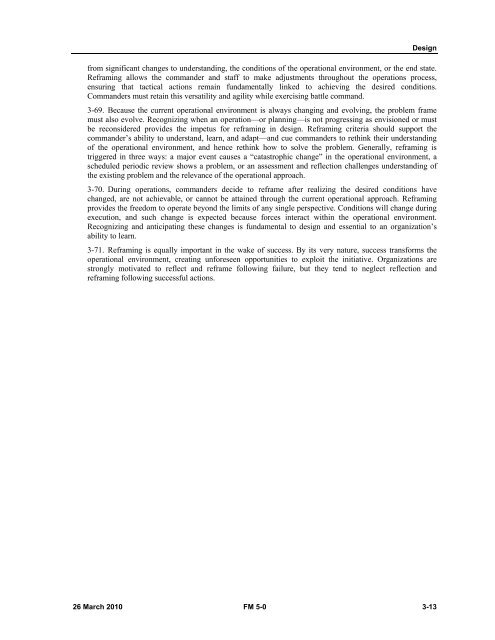FM 5-0, The Operations Process - Federation of American Scientists
FM 5-0, The Operations Process - Federation of American Scientists
FM 5-0, The Operations Process - Federation of American Scientists
Create successful ePaper yourself
Turn your PDF publications into a flip-book with our unique Google optimized e-Paper software.
Design<br />
from significant changes to understanding, the conditions <strong>of</strong> the operational environment, or the end state.<br />
Reframing allows the commander and staff to make adjustments throughout the operations process,<br />
ensuring that tactical actions remain fundamentally linked to achieving the desired conditions.<br />
Commanders must retain this versatility and agility while exercising battle command.<br />
3-69. Because the current operational environment is always changing and evolving, the problem frame<br />
must also evolve. Recognizing when an operation—or planning—is not progressing as envisioned or must<br />
be reconsidered provides the impetus for reframing in design. Reframing criteria should support the<br />
commander’s ability to understand, learn, and adapt—and cue commanders to rethink their understanding<br />
<strong>of</strong> the operational environment, and hence rethink how to solve the problem. Generally, reframing is<br />
triggered in three ways: a major event causes a “catastrophic change” in the operational environment, a<br />
scheduled periodic review shows a problem, or an assessment and reflection challenges understanding <strong>of</strong><br />
the existing problem and the relevance <strong>of</strong> the operational approach.<br />
3-70. During operations, commanders decide to reframe after realizing the desired conditions have<br />
changed, are not achievable, or cannot be attained through the current operational approach. Reframing<br />
provides the freedom to operate beyond the limits <strong>of</strong> any single perspective. Conditions will change during<br />
execution, and such change is expected because forces interact within the operational environment.<br />
Recognizing and anticipating these changes is fundamental to design and essential to an organization’s<br />
ability to learn.<br />
3-71. Reframing is equally important in the wake <strong>of</strong> success. By its very nature, success transforms the<br />
operational environment, creating unforeseen opportunities to exploit the initiative. Organizations are<br />
strongly motivated to reflect and reframe following failure, but they tend to neglect reflection and<br />
reframing following successful actions.<br />
26 March 2010 <strong>FM</strong> 5-0 3-13















